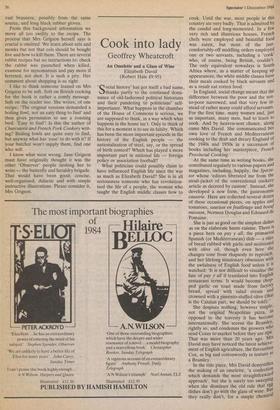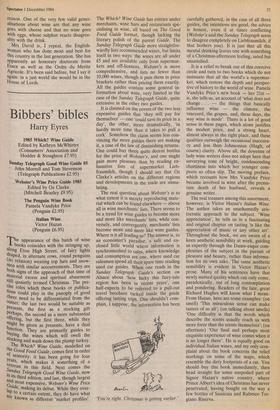Cook into lady
Geoffrey Wheatcroft
An Omelette and a Glass of Wine Elizabeth David (Robert Hale £9.95)
C ocial history' has got itself a bad name, )...) thanks partly to the continued domi- nance of old-fashioned political historians and their pandering to politicians' self- importance. What happens in the chamber of the House of Commons is serious, we are supposed to think, in a way which what happens in the home isn't. Only to think of this for a moment is to see its falsity. Which has been the more important episode in the history of the English people — the nationalisation of steel, say, or the spread of birth control? Which has played a more important part in national life — foreign policy or association football?
What politician could possibly claim to have influenced English life since the war as much as Elizabeth David? She is in all seriousness someone who has revolution- ised the life of a people, the woman who taught the English middle classes how to cook. Until the war, most people in this country ate very badly. That is admitted by the candid and long-memoried. In a few very rich and illustrious houses, French chefs were employed and beautiful food was eaten, but most of the just- comfortably-off middling orders employed one or two servants, including a 'cook' who, of course, being British, couldn't. The only equivalent nowadays is South Africa where, as a matter of keeping up appearances, the white middle classes have their meals cooked by black servants and as a result eat rotten food.
In England, social change meant that the difference between the poor and the not- so-poor narrowed, and that very few in- stead of rather many could afford servants. For the first time, many women and, just as important, many men, had to learn to cook. And by heaven-sent chance, along came Mrs David. She communicated her own love of French and Mediterranean cooking to the drab and dreary England of the 1940s and 1950s in a succession of books including her masterpiece, French Provincial Cooking.
At the same time as writing books, she contributed regularly to various papers and magazines, including, happily, the Specta- tor whose 'editors liberated me from the strait-jacket of the conventional cookery article as decreed by custom'. Instead, she developed a new form, the gastronomic causerie. Here are collected several dozen of these occasional pieces, on apples and tomatoes, saucisse en feuilletage and boeuf miroton, Norman Douglas and Edouard de Pomaine.
. She is just as good on the simplest dishes as on the elaborate haute cuisine. There Is a piece here on pay y all, the primaeval Spanish (or Mediterranean) dish — a slice of bread rubbed with garlic and moistened with olive oil, though even here she changes tone from rhapsody to reproach, and her lifelong missionary obsession with the awfulness of English food unless it Is watched: 'It is not difficult to visualise the fate of pay y all if translated into English restaurant terms. It would become chop- ped garlic on toast made from factory bread, spread with salad cream and crowned with a pimento-stuffed olive (that is the Catalan part, we should be told): She despises nothing, however simple, not the original Neapolitan pizza, as opposed to the travesty it has become internationally. She scorns the BramleY, rightly so, and condemns the growers who send Coxes to market before they are rifle. That was more than 20 years ago. MIS David may have noticed the latest achieve- ment of English agriculture, the flavourless Cox, as big and cottonwoolly in texture as a Bramley. In the title piece, Mrs David demystifies the making of an omelette, 'a confection which demands the most straightforward approach', but she is surely too sweeping when she dismisses the old rule that egg dishes don't go with the glass of wine. Btlt, they really don't, for a simple chemical
reason. One of the very few valid gener- alisations about wine are that any wine goes with cheese and that no wine goes with eggs, whose sulphur reacts disagree- ably with the drink.
Mrs David is, I repeat, the English- woman who has done most and best for this country in the last generation. She has apparently an honorary doctorate from Essex as well as the Ordre du Merite Agricole. It's been said before, but I say it again: in a just world she would be in the House of Lords.























































 Previous page
Previous page